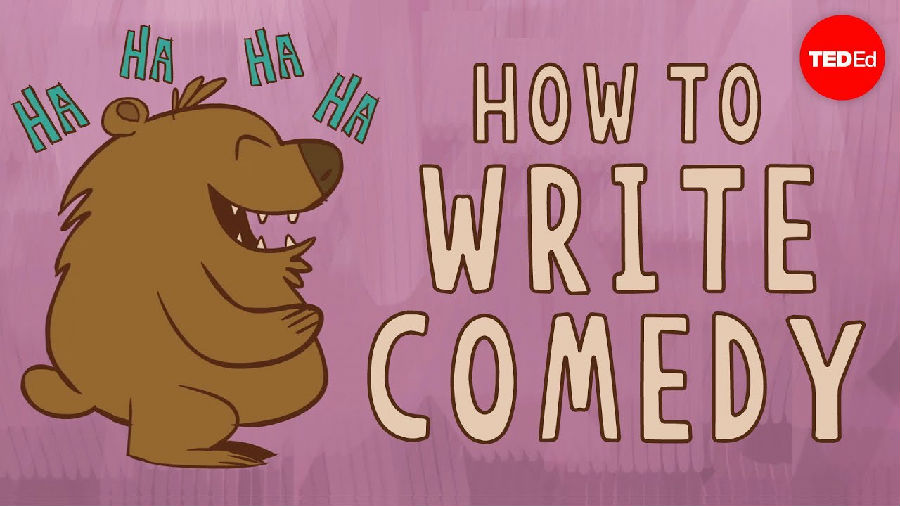(单词翻译:单击)
Did you ever notice how many jokes start with, 'Did you ever notice?'
你知道吗,很多笑话都是以“你知道吗”为开头的。
And what's the deal with, 'What's the deal?'
这时候一般就接着会说“怎么回事儿”。
There's a lot of funny to be found by simply noticing the ordinary, everyday things you don't ordinarily notice everyday.
这就是很多笑话的开场白,仅仅只要注意身边的事,还有那些你平常很容易忽略的小事。
So if you'd like to add a little humor to that story, or speech, or screenplay you're writing,
那么,如果你想加一些小幽默,在你写的故事、演讲稿或者剧本里面,
here are a few tips and tricks for finding the funny.
以下这些小建议和技巧能帮你捕捉身边的趣事。
All great storytelling, including comedy writing,
所有好故事的讲述,包括喜剧的创作,
consists of a handful of basic ingredients: who, what, when, where, why, and how.
都必不可少包含以下几个基本要素:人物、事情、时间、地点、起因,还有经过。
Writers have been asking these questions since at least the 1st century BC,
从公元前1世纪开始,作家们就一直在想这些问题,
yet none can be answered with a simple yes or no.
至今而言,这些问题都不足以简单的是否来回答。
They demand details, and the more specific the details, the funnier the story.
而是要细节,故事里有趣的细节越多,故事就会越能逗笑别人。
Let's start with the who, the comedic character.
先来说“人物”,即故事的主角。
Think about the books, TV shows, and movies that make you laugh.
好好想想那些让你发笑的书、电视节目还有电影。
They're usually filled with funny types, or archetypes.
里面的人物往往都会各种搞笑,这就是“原创搞笑”。
The know-it-all, the loveable loser, the bad boss, the neurotic, the airhead.
无所不知的学霸,讨人怜爱的屌丝,脾气糟糕的老板,神经过敏的人,还有那些没脑子的人。
Incidentally, these are all stock characters found in Commedia Dell'Arte,
巧合的是,这些都是出现在喜剧作品中的人物,
or the artists comedy of late Renaissance Italy, and they have yet to get old.
或者出现在文艺复兴后期的意大利喜剧中,而且经久不衰。
The Commedia rule for creating comic characters is find the flaw, then play it up.
创作一个好的喜剧人物的办法就是找到他的缺点,然后好好把玩它。
Or you can try playing with opposites.
或者来一些反转。
When the smartest guy in the room does the stupidest thing,
一间房间里最聪明的人却做了最蠢的事,
or the doofus outwits the brainiac, we tend to laugh because we didn't see that coming.
或者傻帽做了件逆天的事,人们就笑了,因为我们没有预料到。
Ancient Greek funnyman Aristotle is said to have said, 'The secret to humor is surprise.'
据说,古希腊的幽默作家亚里士多德曾经说过:幽默的秘诀就是惊喜。
This surprise, or incongruity theory of humor,
这种惊喜,或说是不协调的幽默论,
says we laugh at things that seem out of place or run up against our expectations,
认为我们会觉得一些存在反差的或者出乎意料的事情十分好笑,
like a frog dating a pig, or a lizard selling insurance, a baby disco dancing, a nun disco dancing, a cat disco dancing.
例如青蛙和猪勾搭上了,或者一只蜥蜴在上门推销保险,一个小婴儿在跳迪斯科,一个修女在跳迪斯科,一只猫在跳迪斯科。
Actually, a baby, a nun, or a cat doing pretty much anything, especially involving disco.
其实,小宝贝、修女、猫在一起就已经很逗了,尤其是他们还在跳迪斯科。

One fun way to find incongruities is by drawing connections. Actually drawing them with a mind map.
一种建立不协调的方法就是构造关系网。给他们画一张关系图。
Start small. Pick a word, I choose pickle.
画个圈。随便选个词,那就“泡菜”吧。
Jot it down, then quick as you can, try making connections.
画好了之后,用最快的速度试着建立关系。
What do pickles make me think of? Who eats pickles?
“泡菜”让我想到什么?什么人会吃“泡菜”?
What treasured pickle memories do I have from childhood?
我的童年有什么关于“泡菜”的事情?
Another great way to generate comedic material is to shift from observation to imagination.
另一种形成喜剧效果的办法就是把事实变成虚构。
Try going from 'what is' to 'what if?'
试着把真实变成如果。
Like, what if instead of a horse, for example, you just had a pair of coconuts?
例如,怎样能替代一匹马的出现,你只需要一副椰子壳?
Okay, let's think of some other memorable moments in history, literature, or film.
好,我们再来想下历史上其他值得一提的时刻,文学作品或电影。
Now, what if they featured coconuts? Get wild, let it go.
那如果他们都专注于椰子会怎么样呢?随意,你开心就好。
Even if an idea seems overdone, or too obvious, or just plain dumb, try jotting it down, anyway.
即使这个想法显得有点过头了,或者太做作,甚至故作卖傻,那也无论如何把它写下来。
What's obvious to you may not be to the next person.
别人或许和你有不同的看法。
And the opposite of the dumbest idea might just turn out to be the smartest.
你觉得最蠢的想法对别人来说可能是最赞的。
What about all that dumb stuff that happens in real life?
要是那些倒霉事全部都在现实生活中发生了呢?
Have you ever noticed how much comedy revolves around things that irritate, frustrate, and humiliate us?
你有没有注意过身边有多少好笑有趣的事情呢,对自己而言却是恼怒的、失望的和害羞的?
Will Rodgers said, 'Everything's funny as long as it happens to somebody else.'
威尔·罗杰斯说:“每件事都很滑稽,只要是发生在别人身上。”
So if you're having a crummy morning, imagine it happening to a character you're writing about,
如果你上午过得很不好,那把它放在你正在创作的人物当中去,
and by afternoon, you may at least get a funny story out of it.
那到了下午,说不定你就写完了一个搞笑的故事。
Once you've got your characters and story, here are a few quick and easy comedy writing tricks to make them zing.
一旦你想清了人物和情节,就会有一些简捷的小办法能让你的故事变得让人眼前一亮。
The rule of three, or zig zig zag.
三步走战略。也叫转折法。
Try setting up an expected pattern, zig zig, then flip it, zag.
先找两个相似的,成为zig-zig,然后蹦一个,zag。
A rabbi, a priest, and a coconut walk into a bar.
犹太法师,牧师和椰子走进了酒吧。
The punchline rule says put your punch at the end of the line.
这里的规则是东西到你面前你就得喝。
A rabbi, a priest, and a coconut walk into a disco. That brings up the rule of K.
犹太法师、牧师和椰子走进了迪斯科舞厅。这就要说到我们的K原则。
For some reason, words with a k-sound catch our ears and are considered comical.
某种原因上来说,我们总是会注意到那些带有K的音的词,并且这些词会被认为是很有趣的。
Coconut, disco, pickles, crickets? Okay, so we don't always get the laugh.
椰子,迪斯科,泡菜,蟋蟀?好吧...我们并不是总能被逗笑。
Humor is subjective. Comedy is trial and error. Writing is rewriting. Just keep trying.
幽默是主观的。喜剧是尽善尽美的。写作是需要不断修改的。坚持就好了。
Find the flaws, discover the details, insert incongruities, incorporate k-words,
去发现那些糟糕的事,去发现细节,嵌入不协调,再带上那些有K的音的单词,
and remember the most important rule of writing funny: have fun.
记住创作笑话最重要的一条规则:就是自己也能感受快乐。
As Charles Dickins said, 'There is nothing in the world so irresistibly contagious as laughter and good humor.' And disco.
查尔斯·狄更斯说过:“世界上没有什么比好的幽默和笑声更有感染力。”当然还要有迪斯科。


